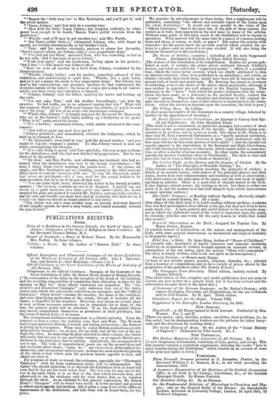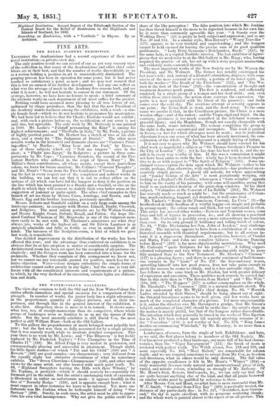PUBLICATIONS RECEIVED.
BOOKS.
.Notes of a Residence in the Canary Islands, the South of Spain, and Algiers ; illustrative of the State of Religion in those Countries. By the Reverend Thomas Debary, MA.
Stuart of Dunkath ; a Story of Modern Times. By the Honourable Mrs. Norton. In three volumes.
Taletta ; a Novel. By the Author of "Denton Hall." In three volumes.
Official Descriptive and Illustrated Catalogue of the Great Exhibition of the Works of Industry of All Nations, 1801. Part L Introduc- tory, and Section I.—Raw Materials.—Classes 1 to 4. Official Catalogue of the Great Exhibition of the Works of Industry of All Nations, 1851.
Companion to the Official Catalogue. Synopsis of the Contents of the Great Exhibition of 1851. By Robert Hunt, Keeper of Mining Records. ["In consequence of the delay in the reception of the goods at the building, and the resulting impossibility of completing their allocation in time for the opening on May 1st," these official catalogues are imperfect. The "De- scriptive and Illustrated Catalogue" only embraces four out of the thirty classes into which the subjects for exhibition are arranged; and the "Official Catalogue," which merely contains the number, the name of the exhibitor, and some identifying particulars of the article, though it includes all the classes, is imperfect in the numbers. However, new issues are to take place as soon as these necessary omissions can be remedied—let us hope, by the time the general public will be admitted. If so, the high-priced visitors may merely congratulate themselves as premature in their privileges, like the eaters of forced fruit out of season.
The arrangement facilitates examination to a liberal curiosity. From the transept as from a centre the building runs East and West. The Western half is appropriated to British, Colonial, and Indian productions ; the Eastern is giving up to foreigners. What may be called British productions greatly preponderate therefore ; we, in fact, fill one half, and all the rest of the na- tions the other. By inspecting the plan attached to either volume, the visitor will easily find his way to any particular country, or as regards British pro- ductions to any particular class of articles. Analytically, the arrangement is not so apt. The bulk of manufactured goods are on the ground-floor and raw materials above them ; "guns, &c. " are vis-a-via to philosophical in- struments, and raw produce next to guns : perhaps the most significant placing of the whole is that which puts the precious metals opposite to food, and chemicals after it.
For purposes of study or record, the catalogues, especially the "Illustrated Catalogue" with its terse explanatory notes, will be indispensable. The visitor who should undertake to go through the Exhibition book in hand will soon find he has got his work before him. The best rule for any one to fol- low on his early visits, is to go first to the class which interests him, and afterwards to use his catalogue only for what strikes him as he wanders through the show. As an assistant to this general exploration, Mr. Robert Hunt's "Synopsis" will be found very useful. It is too succinct and general to afford much specific information, but it gives a coup d'ceil of the different departments of the Exhibition, and tells what will be found there, for six- pence. We perceive by advertisements in these books, that a supplement will be published, containing " the official and scientific report of the Juries upon the whole Exhibition." It would add very greatly to the value of the " Official Catalogue," that is the mere list, it the pith of these reports, the verdict as it were, were appended in the new issue to many of the articles. Without some guide of this kind, much of the Exhibition will be barren to spectators. What interest will the mass take in a parcel of common-looking boots and shoes, or cotton, or cloth, or paper ? But endow the articles with character—let the gazers know the peculiar quality which entitled the ar- ticles to a place—and an interest is at once excited. It will also bring the decisions themselves to the touchstone.] The Poems of &hiller, complete ' • including all his early Suppressed Pieces. Attempted in English, by Edgar Alfred Bowrin,,g. [The feature of this translation is its completeness. Besides the poems pub- Fished as such, it contains the minor pieces scattered through Schiller's dramas, and what are called his " suppressed poems "efforts of a youthful time, which the writer never avowed, which are chiefly attributed to hint on internal evidence, (they were published in an anthology,) and which, as Schiller virtually disavowed them might have been left in obscurity on the ground both of merit and moral taste. Mr. Bowring has aimed at exactness of rendering, even to the choice of the metre, where practicable, although it may neither be popular nor well adapted to the English language. This closeness, or the haste" with which the preface intimates that the trans- lation has been made, or a deficiency in the poetical faculty, renders the "
poems" prosaic. Where the structure and sentiment of the original in- spire interest in themselves, some of that interest is maintained in the trans- lation; where the attraction depends upon the execution, the book is poor.]
The Village Muse. By Calidus. [A short poem descriptive Of the characters in a country village, followed by another on the appearances of morning.] St. Paul's Epistles to the Corinthians; an Attempt to Convey their Spi- rit and Significance. By John Hamilton Thom. [This work is not a commentary on particular passages, but a series of short discourses on the general meaning of the Apostle ; the Epistles being com- mented on by sections, not by verses or words. The object of Mr. Thom is to show that St. Paul considered Christianity as a "purely spiritual sentiment, addressed only to the spiritual affections of man, [and]. understood only by that man who has in him some portion of God's spirit" ; that the Apostle was equally opposed to the superstition of the Romanist and High Churchman, and to the theological dogmas of othersects, which render belief in some doc- trine or other a matter of prime necessity. In other words, the oommentary upholds the modern Unitarian views of Christianity. The style is close and powerful, but at titnes a little too florid or theatrical.] The Cricket-Field; or the History and the Science of Cricket. By the Author of "The Principles of Scientific Batting," &c.
[This volume contains a disquisition touching the entiquity of cricket ; a sketch of its modern history, with notices of the principal players and their styles drawn from oral communication and tradition as well as observation; with ;host essays on the principles of the game, and the best mode of apply- ing them in practice. There is a good deal of original matter in the book. It also displays critical power ; the writing is clever, but there is rather too much of it, and the manner is of that half alangish style which characterizes so many sporting authors.]
The Child's Treasure ; or Reading without Spelling, effectually simpli- fied by a novel System' &c. By a Lady.
[One object of this little book is to teach reading without spelling ; a scheme that was first promulgated about fifteen years ag,o, but does not seem to have made much way. A more general and useful feature is the systematic man- ner in which the alphabetic sound of the vowel is impressed upon the pupil, by choosing syllables and words for the early lessons in which that sound only occurs.]
Practical Observations on the Teeth; designed for Popular Use. By Henry Jordan, Dentist.
[A sensible resum4 of information on the nature and management of the teeth, with some general observations on mechanical and surgical dentistry in its popular aspect.]
Ethel Lee; a Story. By Anna King, Author of "Hours of Childhood." [A juvenile tale, descriptive of family character and domestic incidents, varied by an accusation of robbery brought against an innocent servant, in consequence of his not acting upon the maxim "Shun evil companions." The story is simply written, with truth and spirit in its descriptions.] Family Pastime ; or Homes made Happy. [A book of new fireside games, puzzles, enigmas, charades, &a. ; selected from a number of compositions sent in for a variety of prizes offered by the proprietors of the periodical called The Family Friend.] The Newspaper Press Directory. Third edition, entirely revised. By Charles Mitchell.
[The third edition of this complete and useful publication does not seem to contain any new matter of a generic kind, but it has been revised and the information brought down to the latest date.]
A Grammar of the German Language, on Dr. Beaker's System ; with copious Examples, Exercises, and Explanations, for the use of Schools and for Self-Tuition. By II. Apel. 'fhird edition.
Chambers's Papers for the People. Volume VIIL Supplement to the Post-office London Directory, for 1851.
NEW SERIALS.
Timethrift ; or All Hours turned to Good Account. Conducted by Mrs. Warren. Nos. I. and II.
[There are poetry, tales, sketches, recipes, anecdotes, chess problems, &c. in this serial; but its distinguishing features are the patterns for ladies fancy- work and the directions for working them.]
The Comic History of Rome. By the Author of the "Comic History of England." Illustrated by John Leech. No. L
NEW PERIODICAL.
The Parlour Magazine of the _Literature of All Nationt. No. I. [A new twopennny hebdomadal, consisting of tales, poetry, and scraps. This that number contains a gratuitous supplement, directing the reader 'how to enjoy London during the Exhibition," which consists in an account of some of the principal sights in town.]
PAMPHLETS.
Three Farewell Sermons preached at S. Barnabas, Pimlico, by the Reverend William J. E. Bennett, M.A., in the week preceding the Annunciation, 1851.
A Layman's Examination of the Doctrines of the Scottish Communion Office, as set forth in the Liturgy, Catechisms, &o., of the Scottish Episcopal Church. By Horace Fenwick.
Our Heartless Policy, &e. By an Etonian.
On the Fundamental Relations of Mineralogy to Chemistry and Phy- sics, and on the General Study of the Science. An Introductory Lecture, delivered in 'University College, London, 2d April 1851, by Professor Chapman.
Ifighland Destitution. Second Report of the Edinbusgh Section of the Central Board for the Relief of Destitution in the Highlands and Islands of Scotland, for 1850.
Something on Ruskinism, with a " Vestibule " in Rhyme. By an Architect.



























 Previous page
Previous page